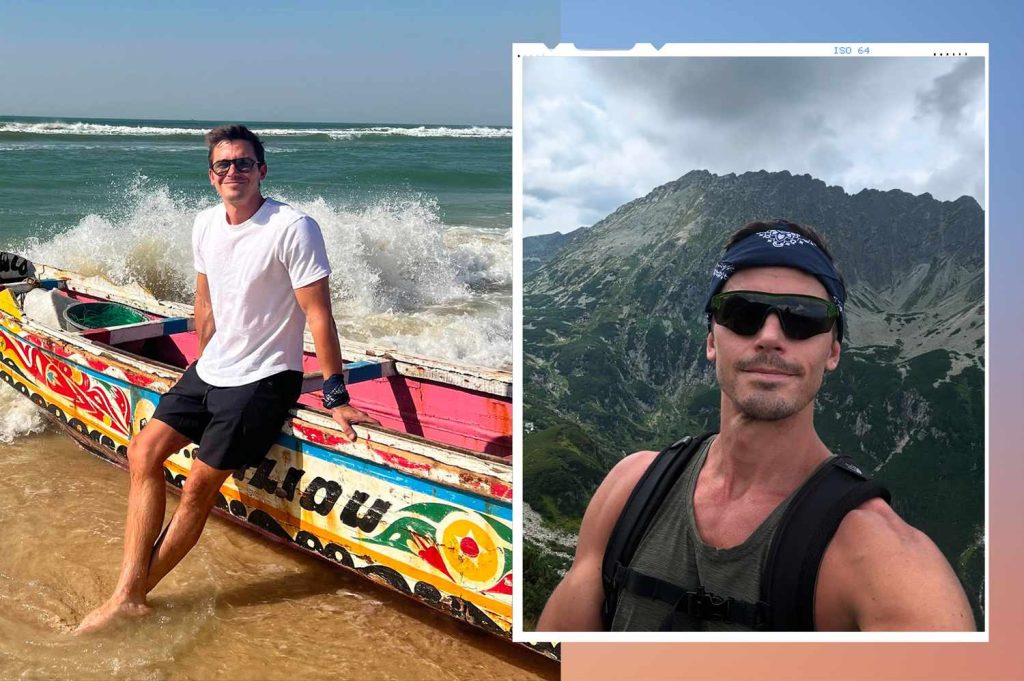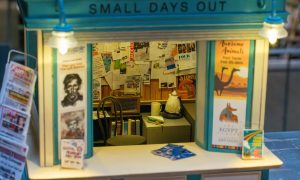:max_bytes(150000):strip_icc():format(jpeg)/TAL-header-antoni-porowski-celeb-check-in-POROWSKICCI0225-2624469d1af846f5a2b7c68dbcc4b16a.jpg)
For Antoni Porowski, a meal is more than what’s on your plate. No matter where you live, the home-cooked dishes you grew up eating tell a story about who you are and where you come from. And that’s exactly what he explores—alongside six celebrity guests—on his new series, No Taste Like Home With Antoni Porowski.
Porowski is known as the always-friendly food and wine expert on Netflix series Queer Eye, and as a cookbook author, and he traces his passion for food to his childhood. He credits his Polish immigrant background and growing up in a diverse community in Montreal for shaping his belief that food can be a great point of connection.
Seong Joon Cho/Courtesy of National Geographic
He recalled, in an interview with Travel + Leisure, one “core memory” from his Montreal childhood: “Once or twice a year in elementary school, they would close down the gym at night, and you and your parents could come and bring a dish from your respective country. A lot of my friends were from multiple different backgrounds, like my best friend, Andrew. His mom was Portuguese and his dad was Iranian, so he would bring a tahdig and a fish stew from Portugal.” And even though Porowski was admittedly a “very picky eater” as a child, he says this experience normalized the diversity, exposure, and access to all different kinds of foods—something he explains is pretty common in Montreal.
“We have a really big food scene. It’s a really good quality of life. There’s a large area in Montreal where, I remember in college, you could go to an Ethiopian restaurant, Greek, Italian, on the same block,” said Porowski. His parents also shaped his interest in food through travel. “My parents traveled so much when I was growing up. They would bring us to some places, but all the really fun spots, like Morocco, they would go alone. But they always came back with food. It was never T-shirts or jewelry or anything like that. It was always tinned fish or some kind of a kielbasa situation if they were in Eastern Europe, so we always got to try the things they had.” His mother, “a fantastic home cook,” according to Porowski, would even recreate the dishes they had on their travels so the kids could try them, too.
And growing up in this diverse environment where food was used as a point of connection and tool for education didn’t just help Porowski learn about other cultures; it helped him understand and appreciate his own Polish roots. “I thought I knew so much about Polish food. It was the first language I learned. We only spoke Polish at home. We were very involved in the Polish community and all the customs as Polish Canadians,” he shared. But later in his childhood, when his family moved to West Virginia, Porowski said he “didn’t want to have anything to do with being Polish.” He added, “I had an ethnic name. I was bringing cabbage rolls to school, like that wasn’t necessarily very ‘cool.’ And so I went through a period of time of figuring out who I was.”
Later during university back in Montreal, he worked at a Polish restaurant where his dad, sisters, and cousins also worked. “If you’re Polish in Montreal, you work there,” he noted. He says this experience changed his perspective. “To meet young people in my age group who have Polish names, who identify strongly with the culture and the food, it kind of made it OK for me. I wish it was something I could have figured out on my own, but it made it attractive to see other people thriving and leaning into where they came from, because at the end of the day, it’s not really something you can change. You were born with it, so you might as well embrace it.”
Courtesy of Antoni Porowski
With Antoni Porowski
Window or aisle?
Aisle
Something you can’t travel without?
Eye mask
Favorite comfort food?
A good cheese and a cracker
Favorite destination for food?
Japan
Favorite filming location?
I would say—because I’m missing the greenery and the lushness and the community—Borneo, specifically Kuching
Dream trip?
Patagonia
Now, in No Place Like Home, which premieres Feb. 23 on National Geographic and the next day on Disney+ and Hulu, Porowski takes others on a similar journey of self-reflection through food and travel. Six celebrity guests—Florence Pugh, Awkwafina, Justin Theroux, James Marsden, Issa Rae, and Henry Golding—join him as they dive deep into family recipes and the stories they hold. And Porowski’s warmth, openness, and curiosity create a safe space for his guests to be vulnerable as they learn sometimes surprising things about themselves and their families.
Throughout the six-episode season, there are moments of real emotion as the actors—who are used to working off a script and hitting their marks, said Porowski—explore their personal ties to the destinations featured. “You’re dealing with actors who have set call times. They memorize their lines. Some of them deeply prepare, others a little less so, but they’re used to rigidity and structure.” This unscripted show was, in some ways, very different than their typical projects. “They knew which city we were going to be in every morning, but they didn’t know what they were doing every single day. We wanted it to be an adventure for them” said Porowski. He said he wanted them “to live and breathe as who [they] are and just live truthfully throughout these circumstances. And they were all genuinely so down.”
Of the experience for the actors, Porowski said, “At the end of the journey, our hope is that it feels like an actual gift, that you have information for yourself to know a little bit more about where you come from, and it’s something that hopefully you can pass on to other family members, kids, whatever it is.” He says that he often talks with his friends about the concept of generational trauma, but that the show also uncovers and celebrates “beautiful generational gifts.”
John Wendle/Courtesy of National Geographic
Issa Rae’s journey to Senegal was especially memorable for Porowski. “She looked at me at the beginning and was like, ‘I’ve seen Queer Eye. You’re not going to make me cry.’ She said it as a joke, but was also half serious. And I swear I had no intention of making her cry.” He continued, “By the end of it, she got really emotional and teared up, just hearing about all these incredible women in her lineage. And it was her words, not mine: ‘I’m standing on the shoulders of giants. I am the way I am because of those who came before me.’”
The connection to and appreciation of your past is one thing Porowski hopes viewers take away from the show. “It’s important to remember that the past, as messy as it is, is also really beautiful. And there are people who have energetically and genetically shaped us to be who we are, and I hope that inspires other people to get curious about their own family histories.”







